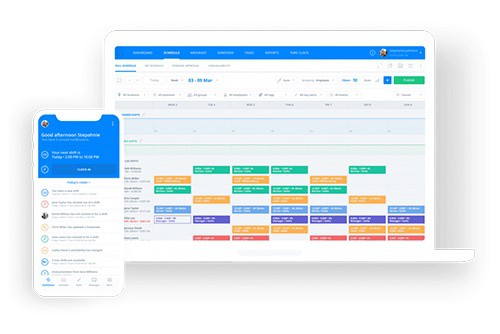Retail Manager Résumé: The Key Skills & Sections To Include
Not sure what to include on your retail manager résumé? We can help. Discover ...

Effective retail management requires a vast array of skills. In a broad sense, those skills boil down to managing your time, managing your staff, managing their training, and managing change.
But those general categories do little to tell you how exactly to get those jobs done.
That’s where we can help. We’ve created a guide to retail management including the specific skills you need to be successful as both a manager and a leader. Let’s dive in!

If you work in retail management, you’re going to deal with problems. It’s just a part of the job. Those problems will pile up and overwhelm you unless you learn to prioritize.
Ranking your problems from most important to least important, and then tackling them in that order, can help you see where to focus your energy.
For example, your point-of-sale software is cumbersome for your employees and customers and needs to be replaced. It’s still working just fine; it just needs to be updated. In addition, your front door is broken making it difficult for your customers to enter.
By prioritizing these problems from most important to least important, it’s easy to see that the front door needs to be fixed right away. Your point-of-sale software update can be pushed off until later because it’s not causing any problems at the moment.
Distractions are legion in the retail industry, but you need to avoid them as much as possible so you don’t waste your time.
Yes, you may have to work on the computer at some point during the day, but try to stay away from reading the news, checking your email repeatedly, or looking at funny cat pictures.
These seemingly innocuous activities can eat up your valuable time and make it harder to get everything done during the workday.
Your employees can come to you with minor issues that can distract you from the larger business issues, like marketing and sales. As difficult as it may be, you have to avoid getting involved in these minor issues.
Give your employees the freedom to make decisions and solve problems for themselves rather than coming to you all the time. This frees up your time so that you can stay focused on the jobs that only you the manager can do.
Being able to discern which issues are minor and which issues are major goes back to prioritizing discussed above.
Developing both of these skills takes patience and time.
But when you’ve strengthened your ability to avoid distractions throughout the day, you’ll find more time to tackle the big-picture issues like examining customer preferences, improving business processes, and improving employee performance.
As a retail manager, you’re faced with myriad decisions throughout the day. Many of those decisions can be boiled down to “Yes” or “No.” Though that may seem like a black-and-white option, it’s actually quite a bit greyer.
Every time you say “Yes” to something, you are, in effect, saying “No” to something else. That can be a problem for retail managers when the “Yes” answers begin to get in the way of keeping your business running smoothly and successfully.
You need to be willing to say no to opportunities, options, and changes that aren’t in the best interest of your business.
Perhaps you may have to say no to hiring another employee while you focus on providing advanced training to your existing employees. Or maybe you have to say no to updating your POS software while you iron out some problems in your sales flow.
Steve Jobs summed up this notion nicely at an Apple Worldwide Developers’ Conference in 1997:
“People think focus means saying yes to the thing you’ve got to focus on. But that’s not what it means at all. It means saying no to the hundred other good ideas that there are. You have to pick carefully. I’m actually as proud of the things we haven’t done as the things I have done. Innovation is saying no to 1,000 things.”

You know what traits your employees should have if they’re going to succeed in your business. Instead of trying to train those traits into your employees, hire employees who already possess the requisite skills.
This goes beyond just retail or point-of-sale experience. It also encompasses traits like efficiency, friendliness, organization, and good manners.
Hiring the right employees starts with writing the right job description. It extends into the interview process where you can really identify the traits you need through questions and answers.
Keep in mind that it’s a lot easier to train someone to operate a cash register than it is to train them to be organized or naturally friendly. Hire employees for their essential traits and then train them for other tasks while they work.
Every employee needs realistic goals to work toward. It could be something as simple as making one more sale than they did yesterday. That’s a realistic goal for most. It motivates them to work just a little bit harder than the day before.
On the other hand, pushing your employees with unrealistic goals can have a detrimental effect on their performance and their morale.
Using the “make one more sale than yesterday” example from above, you, or your employee, might set a goal to make five more sales than the day before. Is that really realistic for your particular business?
If the employee doesn’t make her goal, she might begin to get discouraged which can affect her sales even more. You need to know your industry, and your employees, well enough that you can set reachable, realistic goals for everyone on your team.

Scheduling in the retail industry can be a nightmare. There are so many variables to keep track of: time-off requests, vacations, emergencies, busy times, slow times, what’s best for the business.
But it’s precisely this last variable that can mean the difference between a good day and a bad day.
You want to schedule your employees effectively so that every shift has the right mix of experience and skill necessary for that particular time.
Scheduling to ensure your business’s success means making use of the right tools. Sling streamlines the scheduling process by providing alerts and suggestions so you can avoid double-bookings, conflicts, and scheduling someone when they can’t work.
Sling also helps simplify creation and distribution of your schedule. You can organize everything in the cloud so that it’s available anywhere, anytime. You can also make everything available to your employees online so they can check their work schedule 24/7.

Delegating some of your many responsibilities can help you get more things done. It can also help your employees learn and work better together.
Yes, some things like scheduling and payroll may need to be your sole responsibility. Other things, though, like training, cleaning, and even solving problems, can be delegated to trusted employees.
Giving your employees the opportunity to take on these responsibilities in limited capacity means they’ll be better equipped to deal with the ins and outs of retail management should the need arise.
When your employees know how to handle issues, they won’t have to approach you for a solution. This frees you up to focus on more important matters and boosts the employee’s self-esteem in the process.
Cooperation is the bedrock of every successful team. It can lead to a cohesive unit that works well together under pressure.
It’s your job as a retail manager to encourage and foster that cooperation in each and every employee. Teaching cooperation is a lot like team-building in that the simpler you make it the better.
One excellent way to engender cooperation is through the shadow technique.
Assign employee A to follow employee B around giving assistance where needed or asked for. Tell employee A to look for ways to help employee B.
A few days later, have employee B follow employee A around looking for ways to be of assistance. When that exercise is complete, encourage your employees to continue working together to get the job done even though they are essentially on their own.

Innovation and change are constants in the retail industry. You need to be ready, and willing, to make that change.
This may mean investigating and implementing new processes like customer rewards programs that can increase sales. It may mean considering new payment options, like Apple Pay, Google Wallet, or Bitcoin.
It may mean updating your decor or rethinking your marketing strategy. Just because everything is running well today doesn’t mean it will always stay that way.
As a retail manager, you need to have one eye on the future and recognize when an industry change is on the horizon.
If you can see these changes coming — whether they are style changes, customer preferences, or competitor trends — you’ll be ready when they arrive. You won’t be caught off guard and left scrambling to catch up.
That readiness, and willingness, to innovate can mean success and longevity for your business.
The attitude you display while at work can have a dramatic effect on your retail employees and customers alike.
If your attitude turns negative, your team members may pick up on it and start to develop their own negative feelings. But the trickle-down doesn’t stop there. Your customers may feel the negative vibes, and that can taint their experience for the worse.
Instead of spreading a negative attitude, work on keeping a positive attitude at all times and communicating that to your team and your customers.
If you had to describe the retail business in one word, what would it be? Is “inconsistent” the first thing that comes to mind?
Whether you realize it or not, that may be how many of your employees feel. And that can be a bad thing in some cases.
The constant change and not knowing what to expect from one day to the next can wear away at employee morale, productivity, and efficiency.
To help them adapt to the variability of their workday, demonstrate stability in all other aspects of your work. For example, keep communication lines open and be consistent with your expectations — even when everything else is changing.
Doing so will help your team members stay grounded as their responsibilities and customer needs shift around them.
When it comes to retail management, a good defense is the best offense. And, in order to be prepared for the ups and downs of selling to the public, you have to plan ahead.
Anticipating needs, problems, and roadblocks in your team’s workflow — and taking steps to mitigate their impact on your business — goes a long way toward keeping stress and chaos from running rampant through your employees.
If, for example, one of your servers has turned in their two-week notice, don’t wait until a few days before they leave to start looking for someone to take their place.
Get started with the hiring process right away so you have a replacement lined up and ready to go. Doing so will help you avoid the problems that come with being short-staffed.
Another key to success in retail management is recognizing and rewarding the good work your employees do every day.
Employee appreciation has the reputation of being difficult, time-consuming, and expensive. But with a little creativity, you and your HR department can come up with rewards that everyone will enjoy.
When they see how much you appreciate good work and good behavior, your whole team will be motivated to strive for excellence all the time.
That’s good for everyone involved and will make your business stronger than ever before.
Retail management is all about customer service. Well, maybe not all about it, but it’s certainly a big part.
As we’ve mentioned throughout this article, you can’t expect your team to exhibit high standards in anything if you don’t lead by example.
Take the time to strengthen your own customer service skills so that you can serve as a role model for the rest of your team.
Emphasize behaviors such as:
With these and other customer service skills in hand, you and your team will be able to offer the best retail experience possible.
Training of any kind provides a long list of benefits that your employees won’t find anywhere else.
With skills they learn through on-the-job training, your team will perform their job with more competency, they’ll make fewer mistakes, and your business will run smoother than ever. All of that from a little bit of time out of the workweek every week.
There are many ways to go about setting up this type of program for your team members, including:
However you choose to train your employees, be sure to put the training to use as soon as possible.
For example, if you train your team in a specific skill in October but don’t give them the opportunity to use that skill until February, they’re going to forget what they learned and lose their ability to perform at a high level.
Company culture is more than just how your team behaves.
In fact, it’s a whole host of factors that contribute to the way your business operates, including:
As part of your retail management efforts, work to build a strong company culture by promoting the behaviors that contribute to success and discouraging the ones that don’t.
Retail management puts a lot of demands on your body and mind.
The stress of dealing with customers. Coordinating and organizing your staff rota. Moving heavy boxes and display shelves. Coping with adrenaline. All of these things — and a thousand more — can take a toll on how you feel from one hour to the next.
That’s why it’s essential that you focus on your own fitness — both mental and physical — so you can meet the rigors of the job head-on and overcome them.
Schedule time in your busy day to get some exercise. This will help prepare your body for the necessary manual labor that goes into managing a retail establishment.
And don’t forget to find time to relax when you’re not on the job. Doing so will put you in the right frame of mind to handle some of the most stressful parts of your job.
For the most part, the job of a retail management professional demands that you juggle several different tasks at the same time.
Yes, there will be times when you can focus on one thing for an hour or two, but, more often than not, you’re going to be dealing with a lot of responsibilities, including:
It’s essential that you learn to multitask and deal with multiple projects at the same time so things don’t get away from you.
This may take the form of focusing on one project for a period of time, allowing yourself to switch to another task when necessary, and then returning to the first project without missing a beat.
That’s multitasking in a nutshell and should be the cornerstone of every retail manager’s skill set. Without this ability, you’re going to feel overwhelmed and frustrated in no time at all.
Communication between you and your team, you and upper management, and you and your clients or customers is the cornerstone of effective retail management.
Clear communication contributes to a happy and healthy work environment because it:
When you strive to communicate well — and emphasize that skill in your employees — you’ll quickly see just how important it is for the success of your business.
Promoting diversity in the workplace is a key part of retail management because it opens the door to a long list of benefits, including:
Build your team’s diversity and activities, and your business will improve by leaps and bounds.

Instead of trying to do everything all at once, take it slow and learn these skills one at a time. Prioritize these skills by what you need most to make your business a success.
Start with the most important and practice it until you feel that it has become a part of your management style. Then, move to the next skill on the list and practice it until it’s second nature.
For some of the skills, it may only take a few days to really get the hang of it. For other skills, you may have to stick with it for weeks, months, or even years. That’s OK. That persistence is how we improve as retail managers.
Work your way through your prioritized list until you’ve mastered these skills for exceptional retail management. You, your business, and your employees will be all the better for it.

Taking your retail management skills to the next level requires commitment and time. But the results are well worth the effort.
Sling can help.
Not only does our workforce management software help you schedule time to work on your own management skills and style, but it also helps you simplify and streamline the way you schedule your employees, track time, manage tasks, and communicate with your team.
For more free resources to help you manage your business better, organize and schedule your team, and track and calculate labor costs, visit GetSling.com today.
See Here For Last Updated Dates: Link
This content is for informational purposes and is not intended as legal, tax, HR, or any other professional advice. Please contact an attorney or other professional for specific advice.
Schedule faster, communicate better, get things done.